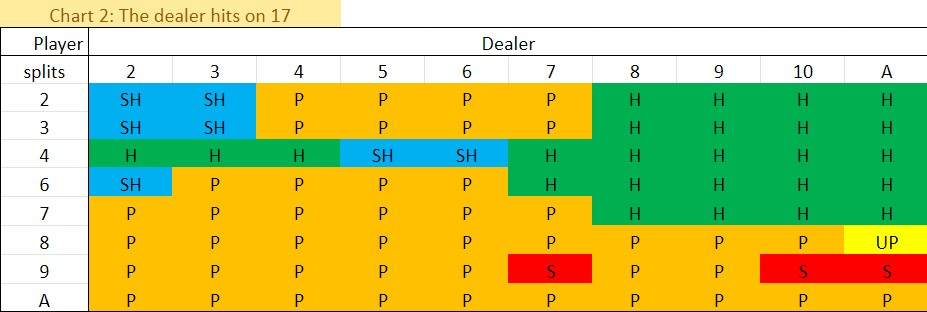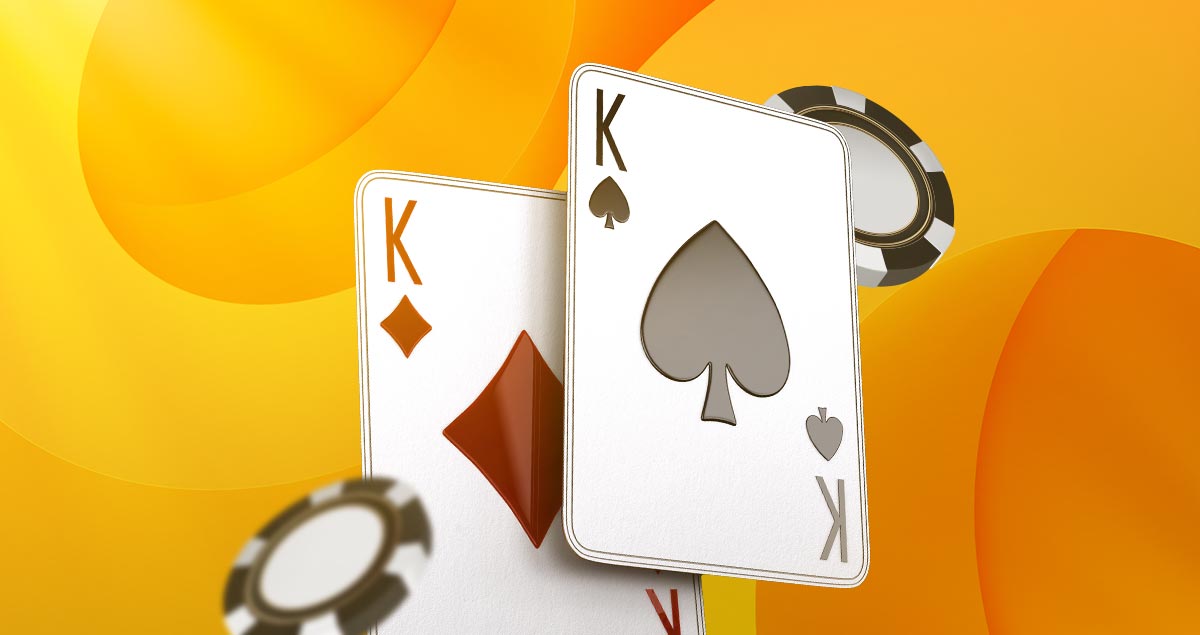Blackjack is one of the most popular games in both the online casino and land-based casino worlds, and it’s relatively easy to follow! While it’s impossible to guarantee a win in games of chance like blackjack and other casino games, some of the appeal of this game lies in the blackjack strategy that has been fine-tuned over the years to help reduce the house edge. Part of that strategy is knowing how (and when) to split in blackjack.
What does splitting mean in blackjack?
In most versions of blackjack available at online casinos, when you are dealt a pair of the same cards, you have the option to split your cards into two separate hands. If you do so, you will be dealt two more cards (one for each new hand), doubling your original bet. Think of it as an additional bet on a second hand which is double your initial bet.
Now, it’s essential to be up to date with the casino rules when you’re playing. This is because some tables may have special rules in place — splitting aces or doubling down after splitting are sometimes prohibited. That said, the majority of the time you will be able to play the hands as usual.
So what’s the point of splitting in blackjack? Well, splitting at the right time can be quite an advantageous move.
Blackjack split rules – How to split in blackjack?
Of course, in a game of blackjack, certain hands offer a greater probability of being successful when pair splitting. There are also hands that you should never even think about splitting, and sometimes the decision is based on what the dealer’s upcard is.
Always split:
- Aces
There are plenty of cards with a value of 10 in blackjack, so of course it makes sense to split a pair of aces, should you be lucky enough to get them. If you decide not to split these two cards, then you’re playing with a soft 12 — only an additional card of nine would bring this hand to the coveted 21. The logic here is simple: always split aces to give yourself higher odds of hitting blackjack.
The exact probability of getting a 10-point card on one of your aces is about 30.77% (roughly four in 13 hands) when playing with an eight-deck shoe. This is quite advantageous to the player, hence why many casinos do not permit splitting aces or doubling down after pair splitting.
- Eights
Having two eights in one hand is considered by blackjack players to be a very poor hand, and playing with it does not leave you in a very good position. All it takes is to hit anything over a five and your hand busts. Splitting eights simply gives you better odds of forming at least one competitive hand.
Never split:
- 10s
A double 10 is a hard 20 — a hand that is quite difficult to improve! No need to give up the comfy position, as the odds of ending up with two weaker hands after splitting are significantly higher than losing with a 20.
- Fours
If you have a pair of fours in blackjack, you cannot lose the game with your next hit. The most you can get when having a pair of fours is 19, which is a fairly decent number to hit. However, if you decide on splitting fours, only three cards will be able to make your hand better than pre-splitting: five, six or seven. The odds are not in your favour if you split fours.
- Fives
Having two fives is a great hand should you decide to double down, unless the dealer you are up against has a nine, 10 or an ace showing. In that case, split fives will likely leave you with either a lower-value hand or a one that has a higher chance of busting down the line. Splitting fives is not your best choice.
When splitting depends on the dealer’s card
- If your hand includes a pair of twos, threes or sevens, while the dealer shows a hand of two to seven.
It’s a good idea to split these three blackjack hands, as they can bust in one or two hits with ease. Generally, splitting these hands is more likely to improve your chances.
- Your hand is a pair of nines, and the dealer has an upcard of two to six, eight or nine.
Splitting a pair of nines in these circumstances is a percentage call, as managing to hit 18 is a pretty good deal, but it can be beaten.
- Your hand is a pair of sixes, while the dealer’s upcard is two to six.
You are more likely to beat the dealer who has an upcard in this range if you decide to split your initial hand of sixes. If you do this, then you are much more likely to hit a 10, so it is a good position to be in against the dealer who is positioned with a relatively weak start.
Blackjack splitting strategy charts
We know that can be a lot to take in, especially if you’re new to blackjack games. But you’re not alone! These handy charts will explain the blackjack splitting strategy visually.
Chart 1: The dealer stands on 17

Chart 2: The dealer hits on 17

Blackjack splitting tips
Here’s a list of some basic strategy tips to keep with you on your next round.
- Split twos, threes, and sevens if the dealer’s hand is showing seven or lower
- Split sixes, when the dealer’s upcard is anything from two to six
- Split nines, when the dealer’s hand shows anything from twos to sixes, or eights and nines.
Since the aim is to get as close to 21 as possible in a round, many pair splitting tips and tricks are just simple arithmetic with a side of strategic thinking.
Benefits of splitting cards in blackjack
Generally speaking, splitting your original pair will work when all the hands are odd to you, reducing losses. It also makes it possible to try your luck one more time, in the way that you want.
Take a blackjack table with eight decks. Imagine you’re dealt a pair of nines, and the dealer is showing sixes. Your chances of a win are high even without splitting. If you split, though, the chances of winning are reduced but the same value of any potential winnings is maximised. And were you to win, the profit earned would be more than the original amount.
Pair splitting can also minimise your chances at losing in some contexts. Say you’re dealt a pair of sevens, and the dealer’s upcard is a two. The dealer is then in a better position to win than you. But if you split, you then increase your chances of winning while minimising the total loss.
Sometimes, you can even convert a losing hand into a winning one. If, instead of a two, the dealer had a six, then the chances of winning is almost equal. In that case, splitting would help you open more avenues to win while reducing the risk of a bust.
Disadvantages of splitting cards in blackjack
Naturally, splitting pairs is designed to benefit the player, otherwise, it wouldn’t be a feature in the game at all! But beware – like any important tool in a player’s arsenal, pair splitting needs to be used correctly or it can backfire.
If in a game you stand to earn twice as much when winning, then it should be noted you stand to lose twice as much too – that’s the nature of this game. Sometimes, it’s not worth taking that risk, and players need to be discerning to utilise a split pair to the best of its ability.
Even then, ‘chance’ is the glue that keeps all casino game cogs turning. If a player were to identify the right moment to split a pair, they would identify their best shot, not a guaranteed one. The dealer could still produce a winning hand, despite the player’s expert use of the move! Ultimately, despite your loss, your choice in splitting a pair was used to your best advantage.

 English
English  Polish
Polish  Ukrainian
Ukrainian  Russian
Russian  Greek
Greek  Portuguese (Brazil)
Portuguese (Brazil)  Slovenian
Slovenian  Hungarian
Hungarian  German
German  Spanish
Spanish 
